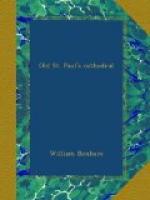A more significant indication of the coming change was witnessed in 1541. In May of the previous year, King Henry issued a proclamation that every parish in England should provide itself with a copy of the English Bible by All-hallow-tide next, under a penalty of 40_s._ He explains that the object is that “the power, wisdom, and goodness of God may be perceived hereby,” but the people are not to expound it, nor to read it while Mass is going on, but are to “read it meekly, humbly, and reverently for their instruction, edification, and amendment.” Accordingly, Bishop Bonner had six of these great Bibles chained to pillars in different parts of St. Paul’s, as well as an “advertisement” fixed at the same places, “admonishing all that came thither to read that they should lay aside vain-glory, hypocrisy, and all other corrupt affections, and bring with them discretion, good intention, charity, reverence, and a quiet behaviour, for the edification of their own souls; but not to draw multitudes about them, nor to make exposition of what they read, nor to read aloud in time of divine service, nor enter into disputes concerning it.”
There was no mistake as to the eagerness of the people to take advantage of the opportunity. They assembled in crowds to hear such as could read, and even, so says Burnet, sent their children to school that they might carry them with them and hear them read.
It is not to be wondered at that Bonner soon found that his Advertisement was powerless to check what he dreaded. Not only did expounders dwell upon such words as “Drink ye all of it,” but they compared the clergy to the Scribes and Pharisees, and identified them with the generation of vipers, and with priests of Baal. Accordingly, he put forth a fresh advertisement, in which he said that “diverse, wilful, and unlearned persons, contrary to all good order and honest behaviour, have read the Scriptures especially and chiefly at the time of divine service in this right honourable Catholic church, yea, in the time of the sermon and declaration of the Word of God, in such sort as was both to the




